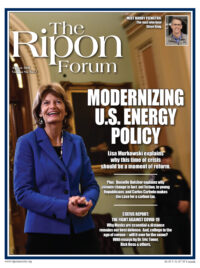
The Republican Party has resoundingly rejected outlandish policy proposals born out of climate change alarmism, chiefly the Green New Deal. Rejecting the heavy-handed and burdensome tactics of these policy fixes was certainly the correct choice, but in rejecting the strategy of these proposals, the GOP has developed a proclivity toward treating climate change as fiction, disregarding a key voting bloc that is concerned about the issue: young Republicans.
Polling has revealed that addressing human-caused climate change is not a fringe concern among young Republicans, but one that many feel quite strongly about. A recent poll of voters between the ages of 18 and 35 conducted by my organization, the American Conservation Coalition, found that 77 percent of right-leaning young voters consider climate change an issue that is personally important to them. More than 50 percent of those right-leaning voters said that the topic of climate change would impact how they voted in 2020.
Additional polling by the Pew Research Center echoes this message. Among young Republicans, 52 percent think the federal government is doing too little to combat the impact of climate change. There is even more support for the development of alternative energy sources, with 78 percent of young Republicans behind the idea. However, 46 percent of these same young Republicans are concerned that environmental policy could have a harmful impact on the economy.
Polling has revealed that addressing human-caused climate change is not a fringe concern among young Republicans, but one that many feel quite strongly about.
It is evident that if Republicans do not take addressing climate change seriously, they are at risk of completely losing young voters. But these young voters are also looking for policy proposals that are different from those being put forth by the left. Young Republicans are looking for sustainable, common sense solutions to combat climate change. They do not want to be forced to choose between a strong economy and lowering greenhouse gas emissions. Luckily, that is a false dichotomy.
The Republican Party has a golden opportunity to lead in the green space. Not only is addressing the issue important if the GOP wants to retain younger voters, but there has never been a better time to present a new way forward. Instead of relying on the same government-led, economically unsound approach, Republicans can present policy options that position the United States as an economic leader as well as environmental leader.
One key way to lead the way forward on a new climate change strategy is by advancing both energy innovation and diversity in energy sources, a winning issue among young Republicans.The American Energy Innovation Act (AEIA), recently introduced in the U.S. Senate, is a package of more than fifty energy-related measures that would directly work to advance an innovation-based approach to clean energy while also strengthening our domestic economy and national security. Senator Lisa Murkowski (R-AK), one of the driving forces behind the package, stated:
“This bill is our best chance to modernize our nation’s energy policies in more than 12 years. By working together to pass it into law, we can promote a range of emerging technologies that will help keep energy affordable even as it becomes cleaner and cleaner. Our bill also addresses national needs by taking overdue steps to enhance our cybersecurity, grid security, and mineral security.”
Another important pillar of a sustainable approach to climate change is reducing the amount of carbon already in our atmosphere. Trees are an excellent example of this in the natural world, but this can be expanded through carbon capture and storage (CCS). Legislation has been introduced that would encourage the research and development of carbon-negative technology. Other pieces of legislation encourage the protection and restoration of natural ecosystems that capture carbon, like oceans and coastal marshes.
Not only is addressing the issue important if the GOP wants to retain younger voters, but there has never been a better time to present a new way forward.
Young Republicans are hungry for a new vision of climate change proposals, ones that are rooted in market-based solutions and limited, not overreaching, government. Some may tell you that we sound like Democrats. That’s simply not true. Our conservative principles are sound, but we are clearly prioritizing environmental issues. If Republicans would like to retain us as voters, party leaders and elected officials must act now and seize the opportunity to lead the way forward with innovative climate solutions.
There is undoubtedly a path forward that does not compromise our principles. Near the end of April, my organization launched The American Climate Contract, the conservative response to climate change. This proposal promotes a market-based strategy, fueled by innovation and American ingenuity. Thousands of our young conservative allies have been mobilized by the potential of a conservative climate plan because, for us, climate change is fact, not fiction.
Danielle Butcher is the executive vice president and chief operating officer at the American Conservation Coalition, an organization that engages young conservatives on environmental issues.




